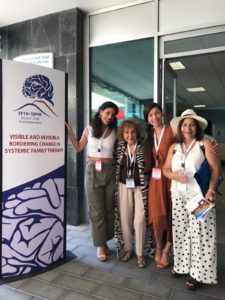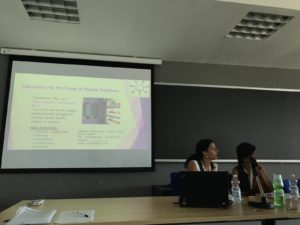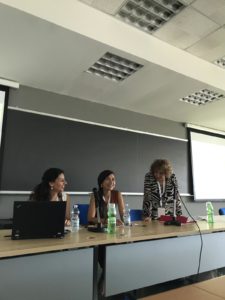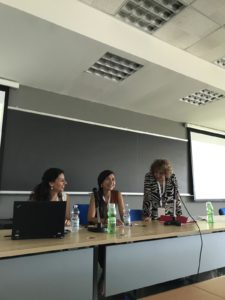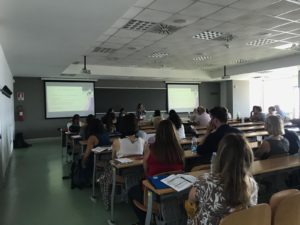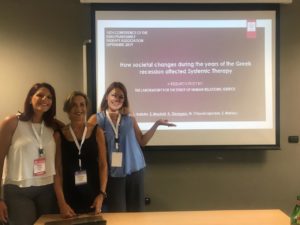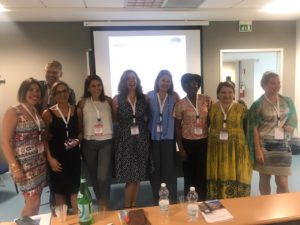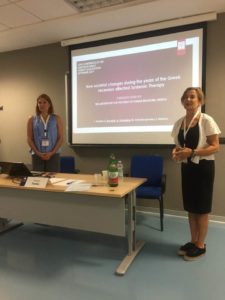
Δυναμική ήταν η παρουσία του Εργαστηρίου για άλλη μια φορά στο 10ο Συνέδριο της EFTA που πραγματοποιήθηκε στη Νάπολη μεταξύ 11 και 14 Σεπτεμβρίου 2019 με τίτλο: Visible and Invisible: Bordering Change in Systemic Family Therapy.
Το Εργαστήριο , Εκπαιδευτές και Εκπαιδευόμενοι συμμετείχαν με τις παρακάτω παρουσιάσεις:
The elephant in the therapy room
Charis Katakis1, Persefoni Spanou2, Antigoni Garyfallaki3, Maria Aggeliki Tsarbopoulou4
1Psychologist, Founder of “Laboratory for the Study of Human Relations”, Athens, Greece; 2Ph.D Psychologist, Systemic Family Therapist, Athens, Greece; 3Educational Psychologist B.Sc., M.Ed., Family Therapist trainee / Ministry of Education, Research and Religious Affairs, Athens, Greece; 4Psyhologist B.Sc., M.Sc., Family Therapist trainee, Greece
An overview of the family therapy literature demonstrates that the adult sibling relationship is a crucial issue often overlooked by the field. The aim of this workshop is to explore how the sibling relationship, that is shaped in the context of our social, cultural, religious, political and interpersonal contexts, determines and is determined by family dynamics and has a great influence in adult life choices (e.g. profession, couple relationships, health etc). Through a short theoretical presentation, clinical material demonstration, display of techniques in the context of an integrative model of systemic psychotherapy and with the help of small group discussions and tasks, participants will have the opportunity to explore the dynamics of sibling relationships. The workshop is addressed to therapists, trainees and other mental health professionals who are looking for opportunities to enrich their practical repertoire of approaches and techniques, which enhance the exploration of patterns of family life.
The use of self in clinical supervision: An integrative approach
Charis Katakis1; Antigoni Garyfallaki2; Konstantina Gerantoni3; Zoi Mylona4; Maria Aggeliki Tsarbopoulou5
1 Ph.D. Psychologist / Founder and President of the Laboratory for the Study of Human Relations, Athens, Greece 2 Educational Psychologist B.Sc., M.Ed., Family Therapist trainee / Ministry of Education, Research and Religious Affairs, Athens, Greece 3 Social Worker/ Family Therapist trainee, Agia Paraskevi Municipality, Social Services, Athens, Greece 4 International & European affairs expert, Family counsellor EAC, Family Therapist trainee, BSc (Honours) Social Psychology (in progress) 5 Psyhologist B.Sc., M.Sc., Family Therapist trainee
Use of self, defined as being aware of inner processes and being able to monitor one’s self, has been recognized among the most important factors in building a therapeutic relationship. During this interactional workshop, a simulation of group supervision will be conducted, based on an integrative model of systemic psychotherapy. The workshop aims at demonstrating the crucial role of supervision in developing the therapist’s ability of self-reflection.
How have societal changes during the years of the Greek crisis affected the systemic therapy?
Maria Leto Katakis, Systemic Psychotherapist, Trainer/Supervisor, President, Laboratory for the Study of Human Relations, Era Moulaki, Systemic Psychotherapist, Trainer/Supervisor, Laboratory for the Study of Human Relations, Maria Chrissicopoulou, Systemic Psychotherapist Trainee, Laboratory for the Study of Human Relations, Artemis Georgara, Systemic Psychotherapist Trainee, Laboratory for the Study of Human Relations, Sara Markou, Systemic Psychotherapist Trainee, Laboratory for the Study of Human Relations
Greece has suffered societal changes in the last decade due to the financial crisis. This survey investigates the changes that the crisis (or other causes) may have triggered within the systemic therapy process. Key objectives are twofold:
- Detect changes in clients’ requests for therapy due to the crisis, as well the impact of life-quality changes on the client-therapist relationship.
- Unveil changes in the development and quality of the therapeutic alliance.
The study combined qualitative & quantitative methods and included:
- Face-to-face, one-hour semi-structured interviews with 20 systemic psychotherapists, half of them practicing systemic family therapy for 1-9 years and half for 10 years or over.
- A structured questionnaire was developed & administered via 2500 telephone interviews to a representative sample of the Greek population, randomly selected, in order to measure psychotherapy incidence rate & its evolution in Greece.
- Desk research regarding basic macro-economic and social measures.
Conclusions give directional insight into establishing a common ground in the systemic therapy community regarding the changes seen in Greek systemic therapy, as well as possible projections for similar countries.
The use of letter writing in promoting systemic changes in families
1Family Therapist / Laboratory for the Study of Human Relations, Athens, Greece; 2Ph.D. Psychologist / Founder of the Laboratory for the Study of Human Relations, Athens, Greece; 3Family Therapist / Laboratory for the Study of Human Relations, Athens, Greece
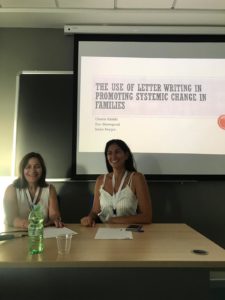
The workshop will present the concept of a letter writing technique and the ways it is being used in the context of an integrative model of systemic psychotherapy. In our practice, through the use of letter writing we manage to strengthen communication between family members as well as between family members and the therapist. It is particularly useful when family members are unwilling or unable to attend therapy. We basically view letter writing as a way of practicing therapy from a distance. In addition to theoretical issues and examples of specific clinical cases, the workshop will also include experiential exercises.

